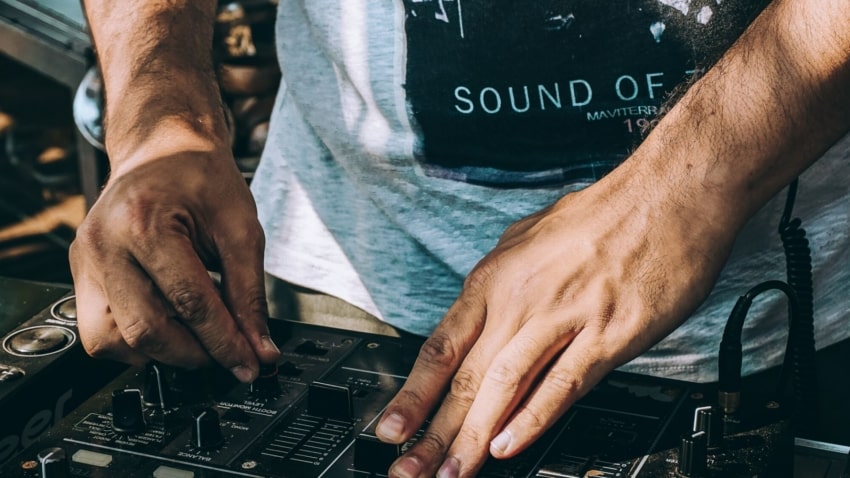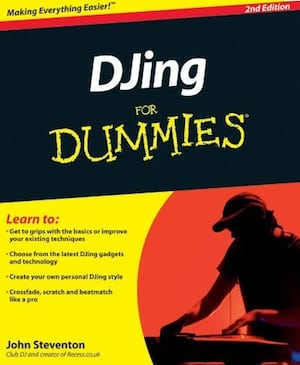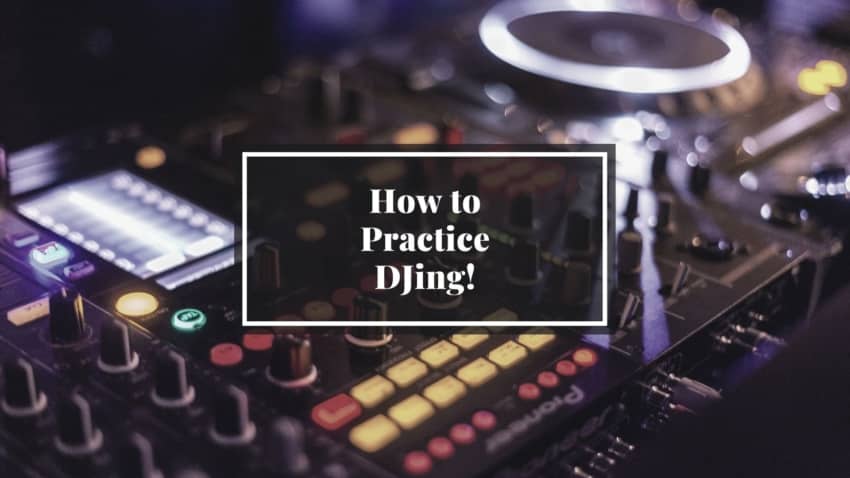Last updated on September 29th, 2021 at 08:58 am
Djing is becoming more and more popular lately, and in order to have a chance to make it you need to improve your skills.
Of course, if you ever want to reach the highest level you can, the best way to achieve this is by practicing the right way.
This is why I wrote this 15-step guide on how to practice as a DJ and not waste time on things that won’t make you any better.
Let’s get straight into it.
- 1. Practice Makes Perfect
- 2. Record Yourself
- 3. Streaming
- 4. Playing for/with friends
- 5. Set a Timer
- 6. Use Simple DJ Equipment
- 7. Learn to Count
- 8. Be approachable
- 9. Don’t Drink and Play
- 10. Ask for Help
- 11. Join Djing Groups
- 12. Choose a Name
- 13. Teach Others
- 14. Read Books about DJing
- 15. Enroll in Online Courses
- Best 4 DJ Controllers for Beginners
1. Practice Makes Perfect
How do you get better at anything?… Practice, Practice, Practice!
Whether you are trying to learn a new language, driving, or a sport, it always comes down to practice. Therefore, practice makes perfect, or so the saying goes.
Actually, practicing the right way makes perfect, but let’s keep going.
Regular practice will help you identify consistent mistakes and help you correct them.
You can do this in your bedroom or download DJ apps and practice while in a car or whenever you have some free time. The more you practice, the more natural your movements and skills get.
2. Record Yourself
Recording yourself during practice sessions is a great way to improve your skill.
You get to listen to your mixes and judge yourself. It is a great way to improve your technical development.
During the recording sessions you may even feel embarrassed when you make a mistake.
This helps you deal with mistakes when Djing because let’s face it, you will make mistakes whenever you are playing to a live audience.
Therefore, recording yourself will help you to understand and manage the pressure of errors while Djing.
3. Streaming
Another useful tool to improve your Djing skills is to stream to a live audience.
It is like number two above, but this time, there is the added pressure of a live audience.
In this digital age, there are various streaming services at your disposal, such as Facebook live, Chew.Tv, among others.
Be careful not to pay too much attention to the likes or viewer count since this may be distracting.
The most significant benefit is that you can get feedback from your audience that can be quite helpful in improving your skillset.
Related: Best Free DJ Mixing Software (you can stream with them).
4. Playing for/with friends
Friends can be a motivating tool, especially if you are a beginner.
In general, most friends seem have the same interests and tastes in music, at least in my experience.
Therefore, inviting friends over and having them listen to a Djing session can help you get constructive criticism and praise that can be quite a morale booster.
They can also help you get used to playing for a live audience.
Additionally, isn’t it a lot less intimidating to play for people you know, who you are certain will give you honest feedback?
5. Set a Timer
This is an excellent way to apply extra external pressure on yourself.
Once you set a timer, you must ensure to play your gig within the time limits set.
This will help you focus more on beat matching and music selection without wasting time deciding on what to play next.
If you’ve never done this, then you’ll notice that you will be much more focused on the task at hand, instead of worrying about details that don’t matter as much.
6. Use Simple DJ Equipment

As a beginner, use simple Djing equipment that is not too complicated to use.
This will help you perfect the basics before moving on to the complicated skills.
You can quickly get excited by loops, hot cues, and filters, which may give you a false sense of excellent skill sets, whereas the basics of listening and hearing of beats are still in need of improvement.
Using an expensive and over-complicated system may confuse you and even give you a sense of panic due to the extra knobs and dials on the mixer.
And just as a bonus, beginner and not so fully-featured equipment is usually cheaper.
At the end of the post I will add a table with the best DJ controllers for beginners, in case you need that info!
7. Learn to Count
This mainly involves what was traditionally known as kicks and snares on the drum sets.
Most songs you play will be in counts of eight.
Therefore, beat matching will involve the matching of kicks on two songs and having them run parallel to each other.
Then at the end of the eighth kick, you can transition to the second song.
This involves excellent hearing skills and is one of the necessary Djing skills that one should learn from the onset.
8. Be approachable
DJs work in high-pressure environments that involve pleasing crowds that are probably drinking and partying the night away.
Social skills are essential as various people will walk up to you with song requests, while others may criticize your outfit and mixing skills.
A Dj must keep his cool and focus on the task at hand. Reacting to every comment or banter will only enrage you or spoil the entire gig.
Be approachable and genuinely nice and ensure to always be in good vibes.
Plus imagine what people will think of you if every time someone comes up to talk to you, even if it’s for criticism, you react defensively… not recommended.
9. Don’t Drink and Play
Following the previous recommendation, is this one.
You should be on your A-Game while performing live, and drinking will only lower the chances of a great performance.
Sure, you might think that it helps because it can calm the nerves, but I would avoid it at all costs.
10. Ask for Help
Sometimes being a beginner can be scary.
You may feel that some of the questions you have may be considered obvious or stupid. Sometimes even finding decks to practice on can be a daunting task.
Do not be afraid to ask any questions or seek help on any matter when learning how to Dj.
Always remember that even the experts such as Laidback Luke and Dj Khaleed probably started where you are, and many are willing to help in any way that they can.
11. Join Djing Groups
There is a ton of groups out there for DJs, and Facebook is a great place to start.
By joining Djing groups, you get to ask questions and get prompt answers from various experts with experience in the industry.
You also get to meet beginners such as yourself who may also be struggling just like you.
Through the support provided in these groups, you will gain confidence and improve your Djing skills.
12. Choose a Name
Choosing a stage name can be quite morale-boosting and a message to the industry that you mean business.
You can go by your official name or choose a nickname/stage name.
Doing this gives you an identity and brand to protect. It also gives you a badge of honor and an unofficial stamp that you are now a DJ.
With a brand name, you can go ahead to open social media accounts and upload various gigs online.
You can also start building a name for yourself and become a force to be reckon with in the industry.
13. Teach Others
By teaching others how to Dj, you get to improve and add to your skills way more than you think.
This will require you to research, gather learning materials, and answer questions from upcoming DJs and, in turn, push you to be better and improve your skills.
Teaching others is not just noble but enhances your reputation in the industry as well.
I’ve always found that teaching is by far the best way of learning.
Sure, you’ll need to have a foundation of skills and knowledge, but explaining something to someone else requires you to have a deep understanding of what you’re trying to teach, which in turn helps you.
14. Read Books about DJing

Believe it or not, there are hundreds of excellent books about DJing that can teach you a great deal; not just about how to become better, but also the history about DJing, and more.
I know this might not seem as appealing to some of you, but I promise you it works.
If you’re interested in finding out more about the best books about DJing, then read my article on that topic.
15. Enroll in Online Courses
Learning to DJ by yourself might seem appealing, and in all honesty might also work, but if you want to fast-track your progress and learn from people who have spent decades perfecting their craft, then online courses are probably the best way to go about it.
I wrote a post about the best online DJ courses available that you should absolutely check out.
The ones I recommend the most are the courses from DJ Courses Online since they offer something for every level.
Some of their best courses are;
- How to DJ; Masterclass
- Advanced DJ Techniques and Tips (Divided into 3 levels)
- DJing Basics
- DJ Career Tips
Best 4 DJ Controllers for Beginners
| Name | Description | Price |
| Pioneer DDJSB3 | Allows for quick progress; Great for learning fast. | Amazon |
| Numark Mixtrack Pro 3 | Simple and easy to use, without too many features. | Amazon |
| Denon DJ MC4000 | Overall Best Controller for Beginners. | Amazon |
| Native Instruments S2 MK3 | Good for beginners but also very professional sounding. | Amazo |
Conclusion
Follow these 15 steps and your practice sessions will improve drastically!
Like I just mentioned, enrolling in an online DJing course might be one of the fastest ways to learn, but if you only follow the previous 12 steps, you should be good to go.
I hope this information was useful.
Have a wonderful day!
